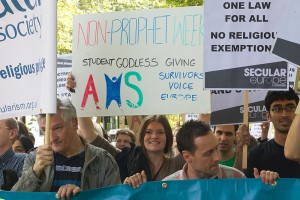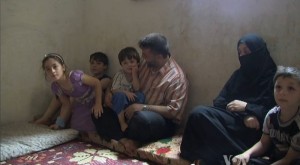Recently I’ve been writing educational materials on anarchism, which has made me think again about this raft of ideological approaches. It is possible to make all kinds of claims for anarchism, depending on how one defines or understands it: for example, either that it is a threat to a peaceful society, or the reverse that it is the most peaceful ideology in existence; that it is the only true road to human freedom, or that it is the ultimate threat to freedom. It also seems to me that defined in one way, everyone is an anarchist, and defined another way, nobody is. If you think of anarchism as a gradual intention to minimise unnecessary interference by the state in people’s lives, with no government merely as an remote ultimate goal, then virtually everyone is an anarchist. If on the other hand you think of anarchism as a revolutionary wish to immediately destroy all coercive sources of order, then really nobody is an anarchist, least of all those who call themselves anarchists when their wishes are more closely examined.
threat to a peaceful society, or the reverse that it is the most peaceful ideology in existence; that it is the only true road to human freedom, or that it is the ultimate threat to freedom. It also seems to me that defined in one way, everyone is an anarchist, and defined another way, nobody is. If you think of anarchism as a gradual intention to minimise unnecessary interference by the state in people’s lives, with no government merely as an remote ultimate goal, then virtually everyone is an anarchist. If on the other hand you think of anarchism as a revolutionary wish to immediately destroy all coercive sources of order, then really nobody is an anarchist, least of all those who call themselves anarchists when their wishes are more closely examined.
All this sounds familiar to me from my philosophical explorations of the function of metaphysical ideas, like those of God, freewill, determinism, materialism etc. Anarchism can be seen as just another of those remote idealisations that have no genuine connection with people’s experience. Our experience is actually of societies in which there are varying degrees of coercion going on, not of a society with final and complete freedom, absolute equality, and no more government. In the mixed up context in which we live, the only function of such idealisations is to support dogmatic actions that are ill-adapted to their environment.
This can be seen, not only from the remote and idealised nature of the conception of anarchy itself, but from its degree of abstracted adaptability. Like God, anarchy can be all things to all people. Every other ideology has its own version of anarchy: there are anarcho-capitalists at the ultra-extreme end of libertarianism, tribal anarchists who are ultra-conservative, anarcho-syndicalists and mutualists who take socialism as their departure point, anarcho-ecologists, and anarcho-communists who offer a slightly more coherent account of communism (than Marx) without the determinism. For all of these ideologies, the appeal to ultimate anarchy is little more than the source of an extra dogmatic edge to their libertarianism, conservatism, socialism or whatever. I suppose out of all the range of anarchisms, it is mutualism that earns my respect most, because it is largely concerned with directly constructing communities or institutions that actually help people to support each other without an appeal to authority, such as credit unions or workers’ co-operatives.
At the same time, again like God, I don’t think that the idea of anarchy is meaningless. It is symbolically important precisely because, for some people at some times, it does stand for or evoke important experiences. It seems to stand symbolically for integration, particularly as understood socially and politically. The final state of society that so inspires anarchists is one in which there is no conflict, and therefore no reason for intervention by authorities. However, to bring about a lessening of conflict, as I have argued a good deal elsewhere, it is integration that is required, with psychological integration meshing with social integration. Our ability to avoid conflict with others depends on our ability to avoid conflicts within ourselves.
So here is perhaps the biggest naivete in Anarchism: it is often described as “having an optimistic view of human nature”, such that, when the imposition of authority from outside is removed, human beings will “naturally” start to behave in a peaceful and co-operative way. This is not naïve because it’s impossible: I don’t think it is impossible, but there’s nothing “natural” about it. For people to co-operate (i.e. be integrated) in such a way, they need to be integrated in themselves, and their integration is a matter of degree, rather than a matter of being “naturally” good or bad. So the state of anarchy could only be achieved, as a matter of degree, by a similar degree of integration amongst all the individuals in the world. We could only work towards achieving it by the practice of the Middle Way. So the way to work towards an ideal state of anarchy involves avoiding metaphysical beliefs such as ones about human nature being “naturally” rational or “naturally” corrupt, or any other such absolutist dogmas.
So, along with pretty much everyone else, I’m an anarchist in a sense. I don’t expect that we will ever reach a state where stable anarchy without the need for government will occur, but I’m happy for that idea to have archetypal importance so long as people don’t start believing in it and using it as the basis of dogmatic judgements. That’s when the harm starts creeping in, whether its from the Angry Brigade or from the free-market egoism of Ayn Rand. I think there is a possible road to such a state of virtuous anarchy through gradual integration, just as there is to enlightenment or God or any other such idealisation. And everyone could be an anarchist in this sense without it making much difference to our political judgements, as political judgements are about what we do, now, in experience, not about such remote ideals.
This is a repost of a blog I posted on middlewayphilosophy.wordpress.com in July 2013. The picture is of unknown origin, but seems to have been used by various anarchist blogs that probably have no respect for copyright law! If it violates any copyright, please get in touch and I’ll remove it.


